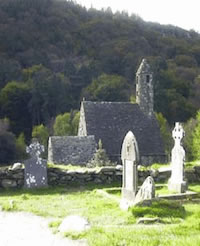
All Souls - November 2nd
Our liturgical traditions reflect their origins in the northern hemisphere. From pre-historic times, the waning of the winter sun has prompted reflection upon life’s end and what lies beyond the grave. In the closing weeks of the liturgical year, the Church has wisely taken account of these old traditions. After celebrating All Saints, we remember All Souls - all those who have died and gone before us. What a contrast there is between the outlook of those who join in these celebrations united in Christian faith and its certainty of sharing in the risen life of the Lord, ‘the first-fruits of all who have fallen asleep’ (1 Cor 15:20), and the uncertainty of those who have no hope, or who turn to other human traditions to understand what lies beyond the grave. The ‘Communion of Saints’, one of the articles of Catholic faith, assures us that our shared life ‘in Christ’ establishes a fellowship that overcomes the limits of space and time. On All Souls Day, this sense of being united in God’s family is a very real part of our celebration.
In this awareness of family bonds, ‘Purgatory’ has loomed large in our Catholic outlook. For a renewed faith, the Church’s teaching on Purgatory should be a source of encouragement. Emphasis upon Purgatory as a state of punishment was misleading. As the name itself indicates, the Church’s belief is in a blessed renewal that makes those who have died ready to enter finally into God’s friendship, to share all things with God. Given our human frailty, few of us die with hearts ready for this. If this mysterious transition involves the pain of the final roots of our selfishness being removed, it must also be a joyful experience for those who know that they are about to know God’s self-giving in eternal happiness.
The readings, therefore, bring us the message of Christian hope. The first reading, from the prophet Isaiah, promises that God ‘will destroy death for ever’, and that the family of God will gather rejoicing around one table.
Or ‘hope is not deceptive’, Paul assures us, grounded as it is in ‘the love of God poured into our hearts by the Holy Spirit’ – a love demonstrated to the world by the fact that ‘Christ died for us’, an astounding fact, that ‘fills us with joyful trust’.
Mark’s account of the death that Christ died for us is a masterpiece – a wealth of meaning expressed in so few words: creation stands still as the earth is covered with darkness; the old order passes away as the Temple veil is rent; and the pagan centurion is the spokesman of a world about to find faith in what God has done. It is important to recognize that the words of Jesus, ‘My God, why have you deserted me?’ – a cry, certainly, that gave expression to the anguish of one going to his death in the darkness of a lost world – are the first words of a psalm (Ps 22) that ends with a magnificent expression of hope and confidence in the God who ‘has listened to the cry for help’. ‘And those who are dead’, it continues, ‘their descendents will serve him, will proclaim his name to generations still to come’.
Year A 2014 - Today’s gospel reading from Matthew - filled with light and joy - is all the more remarkable, in that it follows passages that recall a lack of response to the ministry of Jesus in his own region of Galilee. The leaders of the nation have rejected him; in Judea, he is despised as a Galilean; and now his own people have turned against him. Perhaps this passage, that promises ‘rest’, recalls the times he took his disciples aside to encourage them. But his call is universal, it includes ‘all’ who are overwhelmed by discouragement to come to him. We will find our encouragement in the joy brought by faith in him.
John Thornhill sm

